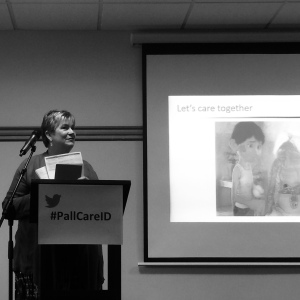
Our Nursing National Clinical Lead for Palliative and End of Life Care, Sandra Campbell, reflects on a year of supporting the Living Well in Communities palliative care work.
What a year! I have loved every minute! Unfortunately the secondment is only one day a week, but fortunately I am able to be flexible with time. I am certainly very grateful to my line manager in my substantive post as Nurse Consultant for Cancer and Palliative Care in NHS Forth Valley for that.
The main purpose of the clinical lead role is to support the Living Well in Communities Team within the ihub at Healthcare Improvement Scotland to deliver on Commitment 1 of the Strategic Framework for Action on Palliative and End of Life Care 2016-2021:
- Identification of need
- Coordination of care
The programme has six test sites across Scotland: Dundee, Glasgow City, Perth and Kinross, East Ayrshire, Fife, Western Isles, and Renfrewshire.
Reflecting back to April 2017, it was hard to imagine how these individual projects would evolve, but it has been amazing to see them unfold due to excellent local leadership within each of the Health and Social Care Partnerships, the guidance and support of assistance improvement advisors in each area and the support of the Living Well in Communities team.
Dr Paul Baughan and I, as clinical leads, have supported from a clinical advisory aspect. A Palliative Care Identification Tools Comparator resource has been developed and is available to support teams in understanding the various tools that can support the identification of palliative care. Paul has supported two webex education sessions, and I will be delivering a webex on the key principles in Caring for People in the Last Days of Life and how this relates to coordination of care.
The test sites will test some of these tools, which will inform wider learning across Scotland. This work will be developed further to inform a resource for care staff in care homes on how and when to use particular tools at different trigger points. Three events will share this learning: the first of which took place on the 31st May (and really saw the Strategic Framework for Action for Palliative and End of Life Care come to life) and a further two are planned for October 2018 and March 2019.
All of the work fits perfectly with the agenda in Realising Realistic Medicine, supporting anticipatory care planning that ultimately enables the right thing to be done at the right time, by the right person, to the right quality standard, with the right outcome.
What is needed is:
- Good assessment and care planning
- Good decision making
- Good care
- Good quality of life until death
- Good death
- Good bereavement
The opportunity for the test sites on the project is to try out different ways of working to improve care and make best use of resources available. Enhancing the generalist support is vital if we are to ensure as many people as possible can remain in their own homes as long as possible.
Other developments
New guidance to support Confirmation (previously verification) of Death will be available shortly from the Scottish Government.
Macmillan has supported projects within the test sites with funding of £120,000.
Macmillan and the Scottish Ambulance Service are in early conversations about developing a national project to improve end of life care and prevent inappropriate admission to hospital and reduce inappropriate CPR.
A key aspect of the clinical lead role is to engage with other stakeholders and we do this on an ongoing basis. People and organisations we have engaged with include:
- NHS Education for Scotland
- Scottish Social Services Council
- Scottish Government
- Scottish Ambulance Service
- Scottish Prison Service
- Major charities, such as Macmillan and Marie Curie
- The third sector
- NHS24
- NHS Inform
- Scottish Partnership for Palliative Care (SPPC)
- Scottish Care
- Care Inspectorate
I have also set up a nurse leads group – now reporting to the Scottish Government, SEND and SPPC. We have a practical work plan that includes bereavement. This group is about sharing best practice across all areas. Standardising care at end of life is helpful to teams and welcomed in the absence of a framework such as the Liverpool Care Pathway.
In caring for the dying patients and those close to them, it is important that staff provide care in accordance with the key principles, which I discussed in an earlier blog post.
You can follow Sandra on Twitter and contact her at
